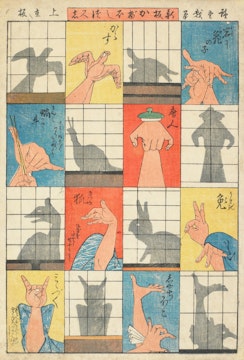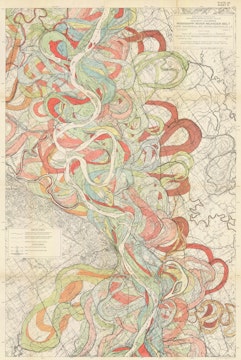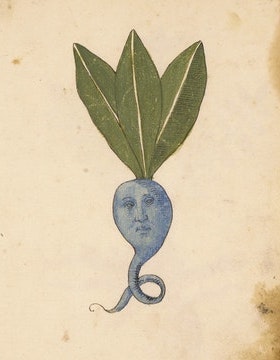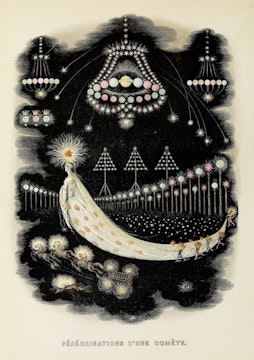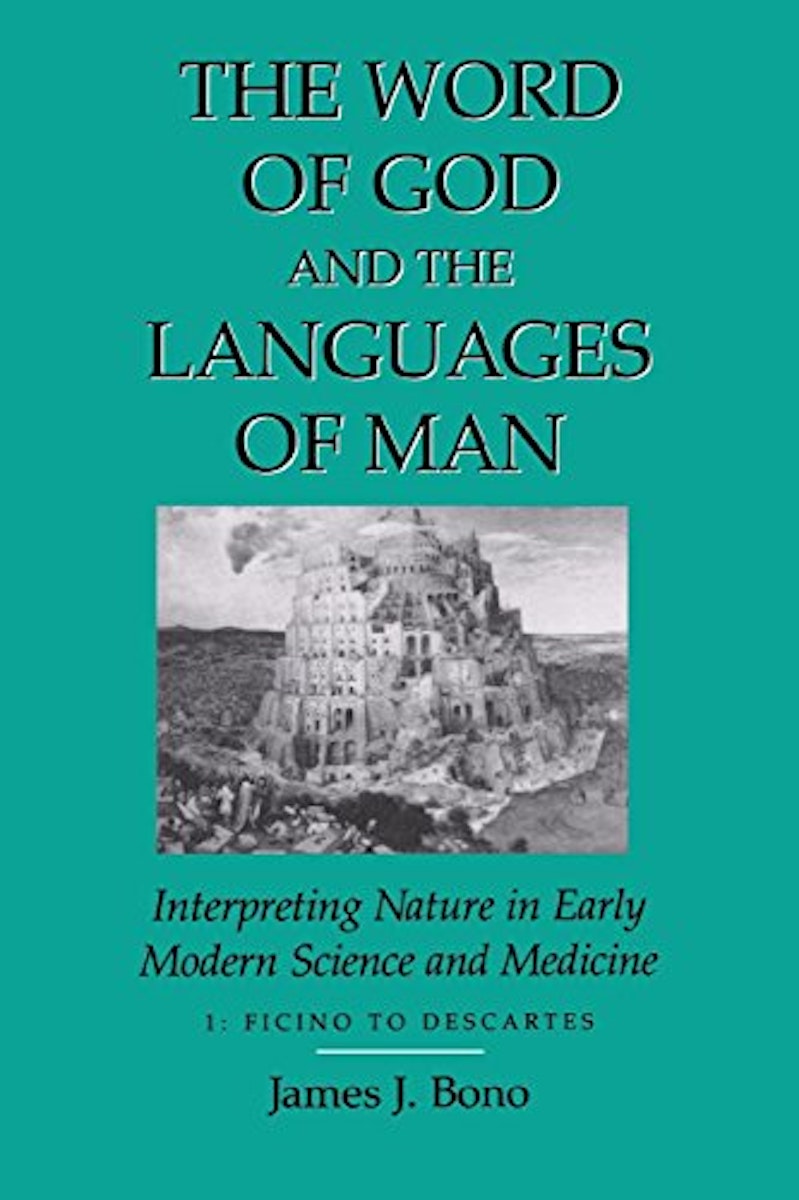
Francis van Helmont and the Alphabet of Nature
Largely forgotten today in the shadow of his more famous father, the 17th-century Flemish alchemist Francis van Helmont influenced and was friends with the likes of Locke, Boyle, and Leibniz. While imprisoned by the Inquisition, in between torture sessions, he wrote his Alphabet of Nature on the idea of a universal “natural” language. Je Wilson explores.
June 1, 2016
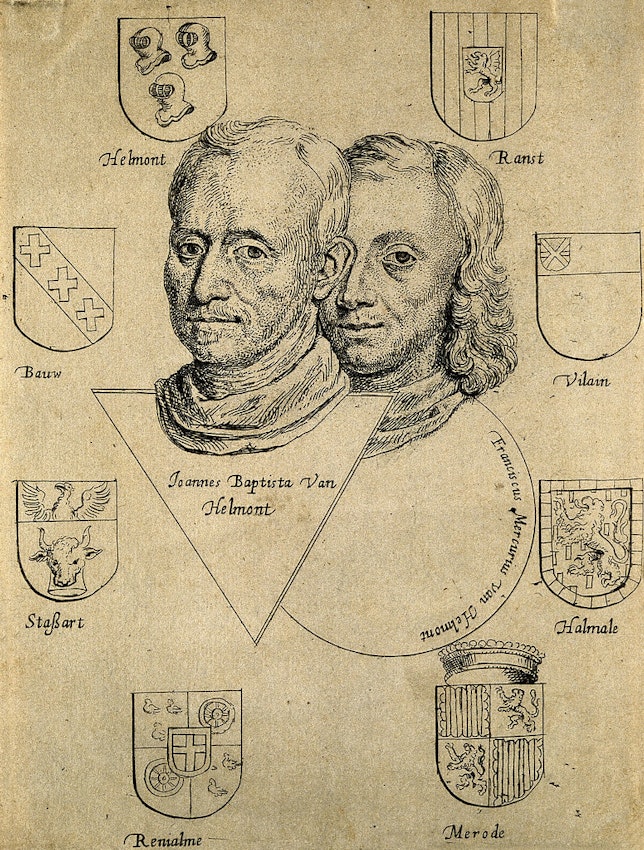 Scroll through the whole page to download all images before printing.
Scroll through the whole page to download all images before printing.Frontispiece to Jan Baptista van Helmont’s The Origin of Medicine (1648), showing the younger Van Helmont partially obscured by the elder — Source: Wellcome Library, London (CC-BY 4.0).
In the frontispiece to his father’s book, The Origin of Medicine, published in 1648, there’s an engraving of a young Francis van Helmont. Tucked into a bizarre overlapping portrait, he peeks out at the reader from behind his famous father’s head, his right eye entirely obscured by the elder Van Helmont’s left ear.
Francis’ father was Jan Baptist van Helmont, the Flemish chemist, doctor, and alchemist who is credited with founding the study of gases, and who claimed to be the first to use the word “gas” scientifically. After an early clash with the Inquisition, which didn’t like some of his nuttier medical ideas, Jan opted to play it safe and asked his son Francis to publish the bulk of his writing after his death. Dutifully complying, Francis squeezes into the picture. Orbited by the heraldic shields of his ancestors, he cozies up to Dad as if ready to take on this intellectual bequest: he will be the Van Helmont, his father’s true heir, for the rest of the seventeenth century.
In some sense, this was accurate. Born in Brussels in 1614 and dying at the end of the century in 1699, Francis left his mark on the era — no less a luminary than Gottfried Leibniz wrote his epitaph — but his historical influence was slight and he is now largely forgotten. He makes an appearance, here and there, thanks mainly to his role in editing his father’s work. As late as 1911, an encyclopedia entry on Jan acknowledges that debt, but in mentioning Francis only scoffs at the “wilder confusion” of “mystical theosophy and alchemy” in his writings.1
And yet Francis, in his own day, was a celebrated physician, innovator, diplomat, and religious thinker, who was friends with the philosopher John Locke and the chemist Robert Boyle, and about whom Leibniz wrote: “If such a man had been born among the Greeks / He would now be numbered among the stars”.2 Leibniz actually ghostwrote Francis’ last book, Thoughts on Genesis, while Francis himself contributed to Leibniz’s metaphysical idea of the monad.3 Although it’s somewhat hard, after four centuries, to see the younger Van Helmont’s “stellar” substance, he was the type of person whose sphere of influence is local and immediate. His ideas generated more excitement in person than they did on paper. Friends found his conversation inspiring and original, and they admired his moral fiber. One, Henry More, even wept at the thought of his “goodness”, saying that Francis van Helmont could “draw moisture from flint”.4 Over the centuries, his influence has seeped down without notice, only to surface unexpectedly here and there. His religious ideas and translations were, for instance, instrumental in shaping the theologian and mystic Emanuel Swedenborg, whose own writing profoundly affected people as various as Emerson, Jung, Balzac, Strindberg, and Henry James, Sr.5
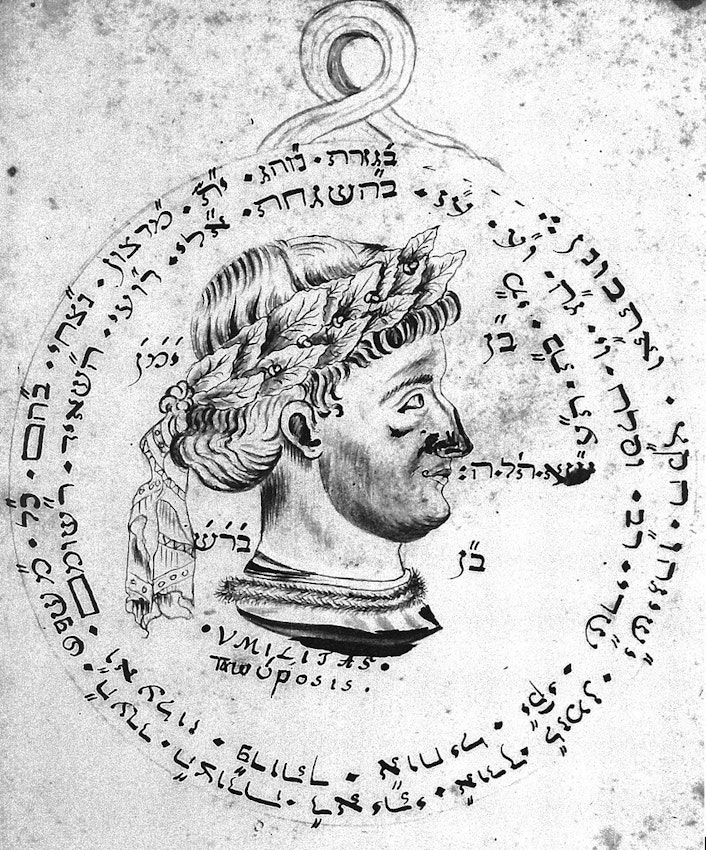 Scroll through the whole page to download all images before printing.
Scroll through the whole page to download all images before printing.Portrait of Francis van Helmont in the style of a classical bust, surrounded by kabbalistic writing — Source: Wellcome Library, London (CC-BY 4.0).
As for Francis’ own intellectual training, he was indebted to his father. He never attended a regular school; instead, Jan homeschooled the boy, spoon-feeding him alchemical, scientific, and mystical ideas along with his pabulum. (Francis’ baby food actually included a “Tree of Life” herbal supplement distilled from the cedars of Lebanon.)6 Jan, a follower of the physician Paracelsus, instilled in his son a reverence for the ancient occult Hermetic beliefs, along with those of the Renaissance Neo-Platonists; this meant that Francis grew up believing in the idea of one true antique theology inherent to all religions, whose divine teachings needed to be recovered. He also learned that man was a complete microcosm of the macrocosmic world, and that the only true knowledge came through divinely inspired intuition. At the same time, since such things coexisted, Francis was taught to respect an empirical scientific method, meaning that his education blended an objective approach to chemistry and medicine with a heavy larding of mysticism.
Such schooling, directed at a boy who displayed a natural bent toward rebellion, would turn Francis into a freethinking misfit, always searching for answers regardless of danger or ridicule. In keeping with his early Lebanese cedar dosing, he became a health-conscious vegetarian and teetotaler at a time when such behavior was considered oddball to the point of insanity. (He did, in fact, live to the age of eighty-four when the average life expectancy was decades younger.) In the autobiographical preface to his father’s work, Francis describes how his relatives looked down on him for his strange ways and thought he would “at length become mad”:
[F]or the preservation of my health, and increasing of my strength, I lived soberly for many Years together, I also abstained from fleshes, like as also from Fishes, Wine, and Ale or Beer; and that so far, that I incurred the contempt and disdain of my kindred, who upbraided me as I conjecture, from a good zeal: What unwonted thing doth he again begin?7
His unwonted leanings persisted all his life. A Christian kabbalist, Francis published translations of kabbalistic writings — the most comprehensive collection of the time. His interest in the Jewish kabbalah, which had acquired its enclave of Christian adherents during the Renaissance, stemmed from his desire to find a common ancient (ancient Christian, of course) source for all religions. It was an unorthodox pursuit, but he was, in general, devoted to unconventional and often liberal ideas: he translated a book advocating the reform of prisons, published writings that promoted religious tolerance, briefly became a Quaker, and established a short-lived work commune in Germany. Meanwhile, he kept busy as a political, economic, and medical advisor to princes, princesses, and other nobility — finding time between his doctoring and diplomacy to devise a mechanical cure for scoliosis, design a new kind of spinning wheel and a more efficient wheelbarrow, learn carpentry and weaving, and invent running shoes with springs. He also figured out how to temporarily preserve the corpse of his good friend Anne Conway (he pickled her in wine inside a lead coffin with a glass window) until her husband could return home from abroad and gaze at her features one last time.8
One of Francis’ more fascinating areas of study is a peculiar book he wrote on the subject of Hebrew. He formed his ideas about the language while being held and tortured by the Inquisition for a year and a half. In 1661, before he had published anything at all, the Catholic Church arrested and charged him with “judaizing” or of being a Jew, a catch-all charge in the seventeenth century that, in Francis’ case, appeared to mean “you have liberal ideas”.9 They were right about that — though, ironically, he would far rather have converted the Jews to Christianity than become a Jew himself — and he had every reason to expect he might be burned at the stake. Regardless, he took his imprisonment in stride, and between trips to the torture chamber he conceived his theory of language.10 Usually referred to as the Alphabet of Nature, the small book outlines Francis’ concept of Hebrew and his scheme for teaching deaf-mutes to speak it. The frontispiece to the book shows Francis sitting at a table in his cell in Rome; facing a mirror, he is scientifically measuring his lips with a pair of calipers.
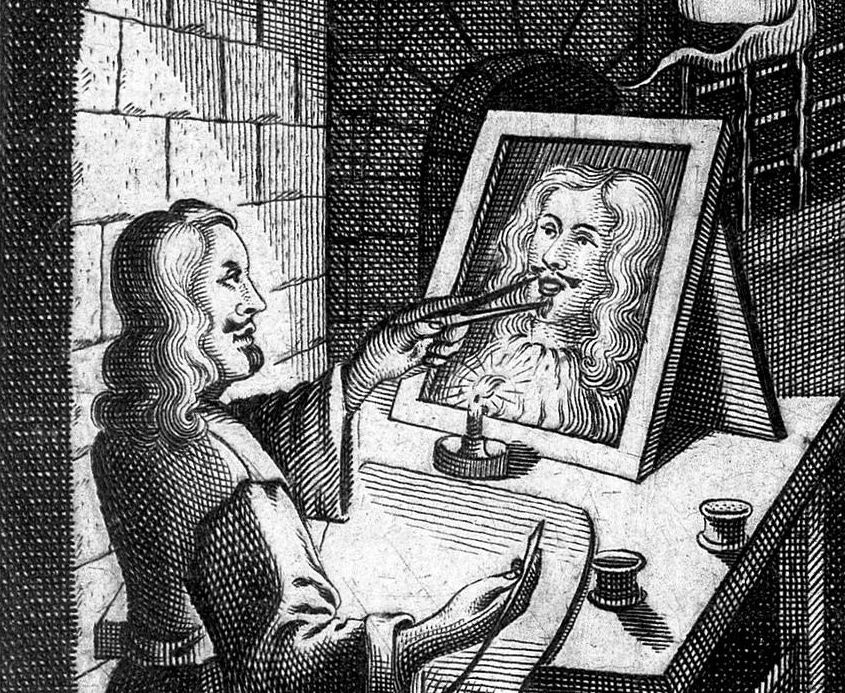 Scroll through the whole page to download all images before printing.
Scroll through the whole page to download all images before printing.Frontispiece to Francis van Helmont’s Alphabeti vere Naturalis Hebraici (1667) — Source: Wellcome Library, London (CC-BY 4.0).
The theory he propounds is that the ancient and therefore uncorrupted Hebrew characters are actually diagrams illustrating how the lips and tongue should be positioned when uttering the sounds they make. A series of woodcuts in the book show cross sections of heads in profile with the speech organs exposed to reveal how they are shaped exactly like Hebrew letters. This resemblance — a kind of pronunciation guide — means that people who are deaf can easily learn to sound out Hebrew because the tools for speaking it are innate, rooted in the very bones and muscles of our bodies; our organs for speech match this wholly (and of course holy) “natural” language. Francis van Helmont, a whimsical proto Noam Chomsky, believed not that we are born with a mental template or apparatus for learning grammar but that we are born with the shape of the Hebrew characters literally written (or at least easily writable) in our mouths and throats.
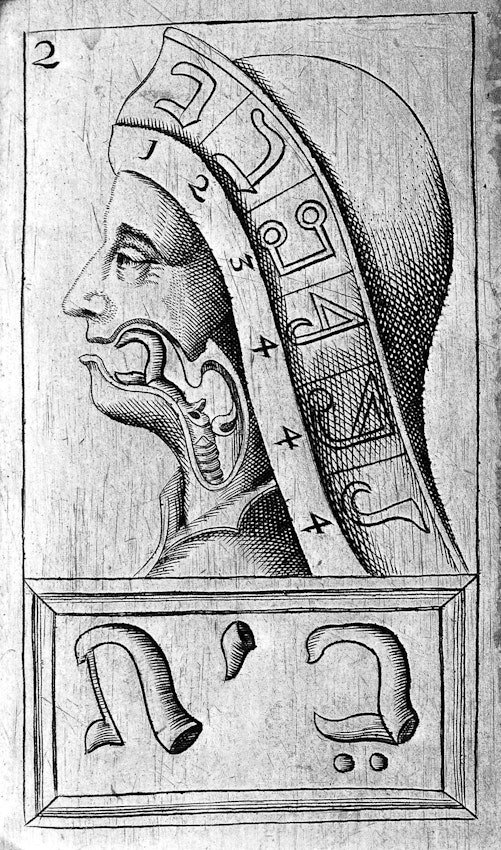 Scroll through the whole page to download all images before printing.
Scroll through the whole page to download all images before printing.One of 36 instructional woodcuts featured in Francis van Helmont’s Alphabeti vere Naturalis Hebraici (1667) — Source: Wellcome Library, London (CC-BY 4.0).
Though his theory was eccentric, Francis’ preoccupation with the idea of a natural language formed part of a long historical debate, still active in the seventeenth century, over whether language was natural or artificial. Since antiquity, two schools of thought had grown up around the question, with some believing that language was made of random symbols — a view Aristotle held — and some thinking words and letters accurately represented nature, an idea Plato was drawn to but which he ultimately found impractical and unlikely.11 Despite Plato’s misgivings, Neoplatonists and alchemists of later centuries embraced the idea of a purely natural language that had an innate connection to reality, as did Jewish and Christian kabbalists. For Francis van Helmont and those who thought like him, the abstract signs of language, especially the divine language of Hebrew, were firmly concrete. Words, letters, and symbols carried an innate power that not only corresponded intrinsically to the things they represented but could also reveal the invisible spiritual truths and secret symmetries of the universe.12
As for ancient Hebrew, it was of course the most natural language since it was the one God had specially given to Man, something you believed if you were similar to Francis, though this idea was of course hotly debated among philosophers and Christians, as were other related points about language.13 Do thoughts precede words or is language the prerequisite for thinking? Do things in the world exist before they are named? Which came first, the chicken or the word “chicken”? Francis would have said that the word came first. God had the word, and then made the chicken that corresponded to it; as each animal was created, it stepped into an already existing word-coat that perfectly expressed its essence. Adam, who later in Genesis names the animals, is therefore (from Francis’ perspective) being divinely inspired to name the animals with their real names, and not with randomly invented words. Given Francis’ belief that all true knowledge is latent in our microcosmic bodies — accessible through divine revelation — it is not surprising that his model of language imagines the Hebrew characters as being almost engraved inside us, physically wedded to our mouths.
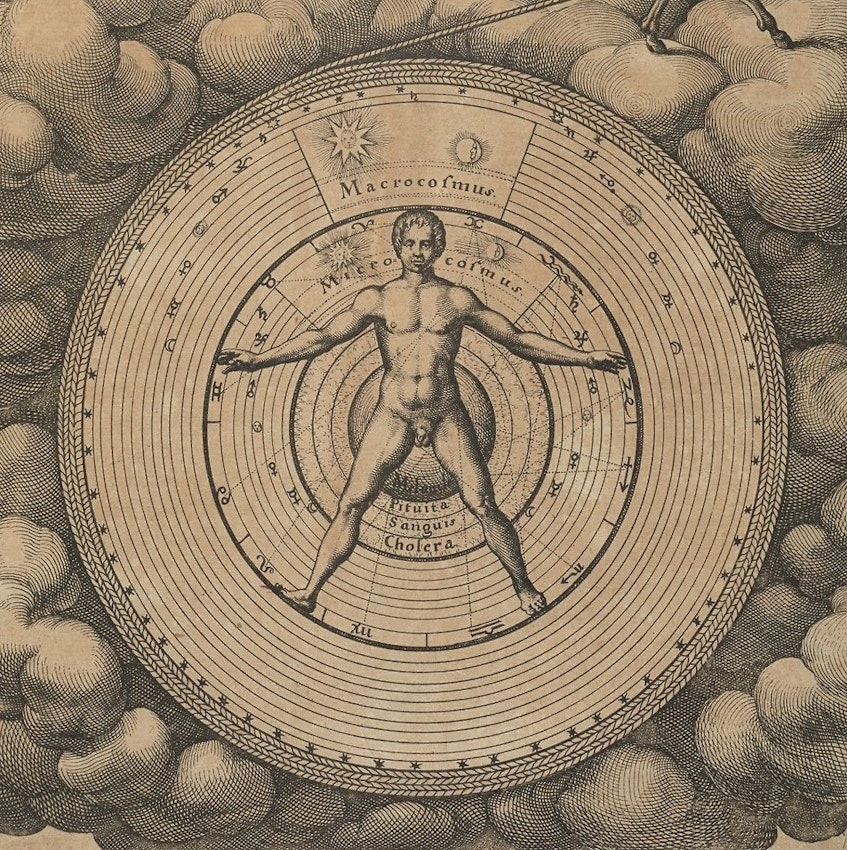 Scroll through the whole page to download all images before printing.
Scroll through the whole page to download all images before printing.One of many depictions by Robert Fludd of man as a microcosm of the universe, title page from his Utriusque cosmi maioris scilicet et minoris metaphysica, physica atque technica historia (1624) — Source.
Taken to its limit, however, this faith in intuition and the innateness of knowledge could become dangerously democratic at a time when hierarchies were strictly enforced. Martin Luther, after all, founded Protestantism on such egalitarian bedrock: that any reader of the Bible had direct access to God. Even though Christian kabbalists thought their pursuits wholly in keeping with religiosity — “there is no department of knowledge that gives us more certainty of Christ’s divinity than magic and cabala” wrote Giovanni Pico della Mirandola in 1486 — the Church begged to differ.14 Although tolerant to some extent, it considered the occult problematic, and to believe too strongly in the power of words could lead to trouble. For the Church, the idea that words could conjure, or that they held the means to some deep well of unsanctioned knowledge, undermined ecclesiastical authority. And if God wasn’t officially involved, then the supernatural force at work must be demonic.
Had they known about it, his jailors would have considered Francis’ incipient work on language heretical. But long before it was published, they were already trying to condemn him for his unconventional behavior. Being tolerant and ecumenical at a time when Christian sects were killing each other on a daily basis, Francis was not popular with either Catholics or Protestants, and was in fact almost killed by a mob of Lutherans for trying to encourage compromise.15 His own description of himself in the preface to his father’s work might give an idea of what people didn’t like. Here, he says, is what is being said about him:
[H]e is no where seen except in the company of most unconstant, strange, and uncouth persons, of whatsoever profession and employment; he will also incur a misfortune, for he knows not how to dissemble, he spareth none, neither great nor small, when he discerns that which is unjust.16
Others were right to think he’d get in trouble. His interest in justice, reform, and plain speaking did not endear him to the Catholic Church. Shortly before he was arrested, he made himself unpopular by working for a German prince who had asked him for advice on how to boost a region still economically depressed from the Thirty Years’ War. Francis suggested farming and skilled work for peasants and the “sons of citizens” alike.17 The result was a collection of workshops whose students included gentlemen and at which everyone learned how to weave, cook, cobble, and work the anvil, and where even the prince himself was invited to eat, work with his hands, and walk rather than ride. Hebrew was taught to all. The Inquisition fumed at the idea of such socialist class leveling: the nobility and the upper classes were being degraded. In its report, it was especially disgusted with Francis’ suggestion that the prince raise pigs (in “filthy pig pens”) on palace grounds.18 Francis was eventually released from the dungeons of Rome, but only because he had powerful friends who pleaded on his behalf, including that pig-tolerating prince himself.
Like many books on the idea of a universal language, the Alphabet of Nature was a utopian work. Francis believed that discord would end if everyone could speak the same divinely inspired language and no longer disagree over the meaning of the scriptures. In the 1600s, the idea of a universal language appealed to many who thought there was room for improvement in the world’s ability to communicate.19 Many were invented, though none of those seventeenth-century languages became as successful as Esperanto, developed in 1887. One of the few to gain a following was that created by John Wilkins, who published his scheme in 1668, only a year after the Alphabet of Nature. In Wilkins’ “philosophical language”, every word contained its own definition, a dizzyingly rational design whose preposterousness appealed to Jorge Luis Borges: “children could learn this language without knowing it was artificial; later in school, they would discover that it was also a universal key and a secret encyclopedia”.20
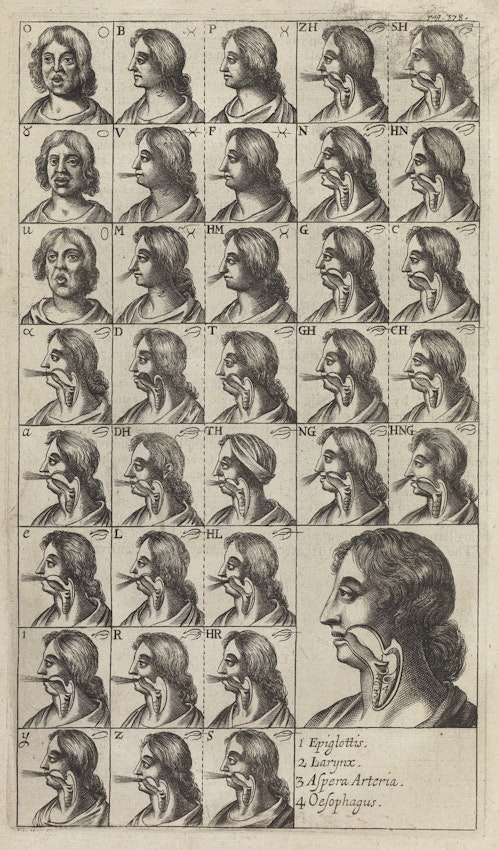 Scroll through the whole page to download all images before printing.
Scroll through the whole page to download all images before printing.Illustration from John Wilkins’ An Essay Towards a Real Character and a Philosophical Language (1668), showing formations of the larynx during the pronunciation of different letters — Source: Wellcome Library, London (CC-BY 4.0).
To Francis van Helmont, though, ancient Hebrew already was the ideal universal language, the key that unlocked us and whose codes we held within; he would have considered the invention of a new and secular one counterproductive. St. Jerome might have called Hebrew the “language of hissing and broken-winded words” in contrast to the elegance of Latin, but for Francis ancient Hebrew was the bodily inscribed answer to perfect knowledge and harmony.21
It is hardly surprising that being isolated in prison made Francis think about being stuck on an island of deaf-mutes. Apart from the seclusion, he was also perhaps thinking of his torturers, who for a year and half were deaf to his reasoning. How could he communicate with these people, how could he make himself understood? He looked in the mirror, looked at himself as a source of knowledge, and his reflection told him everything: if you started with the smallest footnote of a man from the seventeenth century, you could end up with the book of the universe; if you examined the tongue and glottis, you might discover how easy it was to utter the natural words of Hebrew. Connection and understanding were possible, he believed: we could all speak the same language. In a time of raging violence among religious sects, this was indeed a hopeful attitude.
In 1699, the year Francis died, Jonathan Swift’s fictional character Gulliver set off on his travels. In the story, Swift satirizes the idea of a universal language when he has Gulliver visit scholars hard at work on “a scheme for entirely abolishing all words whatsoever”, in which it is proposed that people carry around objects instead of speaking: “if a man’s business be very great, and of various kinds, he must be obliged, in proportion, to carry a greater bundle of things upon his back”.22 Ironically, a scholar has recently suggested that the supposedly made-up nonsensical words of a Lilliputian language Gulliver encounters are actually closely derived from Hebrew, which Swift studied at Trinity College.23 These Hebraic words actually lend a measure of sense to what the Lilliputians are saying, meaning that Swift, in trying to invent a new foreign tongue, found himself borrowing, either consciously or not, from Francis van Helmont’s most natural and ideal “universal” language. Francis, too courteous to take the last laugh, would hardly have been surprised.
Jé Wilson is a writer who lives in New York. @jewilsn

